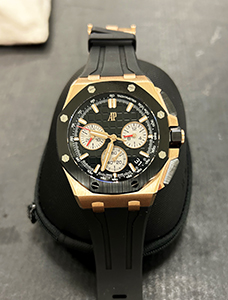PHILADELPHIA – A U.S. citizen who arrived from Spain on Halloween thought he could trick U.S. Customs and Border Protection officers at Philadelphia International Airport. But his trick failed and he certainly wasn’t happy with the treat he received.
CBP officers seized over $80,000 in merchandise that the man purchased during his trip after the man repeatedly refused to truthfully declare all of his purchases. Travelers are permitted up to $800 in duty exemptions and must pay a duty on merchandise totals exceeding $800.
To make matters worse, the traveler was a CBP Global Entry trusted traveler. Was, as in not for much longer after CBP officers requested a revocation of his trusted traveler status for violating the terms of that trust.
Global Entry is one of U.S. Customs and Border Protection’s most popular trusted traveler programs. CBP permits expedited arrivals processing from overseas trips to fully vetted applicants and in return Global Entry members vow to comply with all U.S. laws and regulations. Consequences for violating that trust can be severe.
During his primary inspection, the traveler declared to a CBP officer that he possessed only $700 in merchandise that he bought on his trip. The primary officer referred the man to a secondary examination where the traveler continued to declare only $700 in merchandise. During a subsequent baggage examination, CBP officers discovered merchandise and receipts totaling $80,932.
The merchandise included an Audemars Piguet Royal Oak Offshore watch, Gucci, Chanel, and Yves St Laurent handbags, a Dan John bomber jacket, and two pairs of Golden Goose Ball Star sneakers.
Travelers who fail to truthfully declare the total amount of their purchases that exceed the duty exemption have the option to pay the appropriate duty for their merchandise along with a steep duty penalty, or they may opt to abandon the merchandise.
“Customs and Border Protection’s trusted traveler programs are essential in helping us to secure our nation’s borders by allowing us to focus more on higher-risk travelers and cargo, so when we encounter a trusted traveler deliberately violating our nation’s laws, we take swift and decisive action to revoke that member’s privilege,” said Cleatus Hunt, CBP’s Area Port Director for the Area Port of Philadelphia. “This experience should be a reminder to all travelers, and more importantly to trusted travelers, to be honest with CBP officers during arrivals inspections about the things they are bringing back to the United States.”
The purpose of Customs Duty is to protect each country's economy, residents, jobs, and environment by controlling the flow of goods, especially restrictive and prohibited goods, into and out of the country. Travelers should also be reminded that merchandise purchased in duty-free shops are free of duty only for the country in which that shop is located.
Travelers can learn more about Customs Duty and items that are prohibited or restricted from bringing to the United States before departing on their next international trip.
CBP's border security mission is led at our nation’s Ports of Entry by CBP officers and agriculture specialists from the Office of Field Operations. CBP screens international travelers and cargo and searches for illicit narcotics, unreported currency, weapons, counterfeit consumer goods, prohibited agriculture, invasive weeds and pests, and other illicit products that could potentially harm the American public, U.S. businesses, and our nation’s safety and economic vitality.
See CBP’s enforcement stats to see what other dangerous drugs CBP is encountering at our nation’s borders. See what CBP accomplished during "A Typical Day" in 2023. Learn more at www.CBP.gov.
Follow the Director of CBP’s Baltimore Field Office on Twitter at @DFOBaltimore for breaking news, current events, human interest stories and photos, and CBP’s Office of Field Operations on Instagram at @cbpfieldops.


